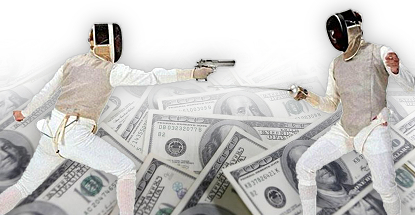 The group trying to repeal Massachusetts’ casino legislation is being seriously outspent by their pro-casino opponents. The Repeal The Casino Deal group managed to convince a court to put the 2011 casino legislation repeal question on this November’s election ballot but they’re being outspent by a 7-1 ratio in attempting to sway voters over to their side.
The group trying to repeal Massachusetts’ casino legislation is being seriously outspent by their pro-casino opponents. The Repeal The Casino Deal group managed to convince a court to put the 2011 casino legislation repeal question on this November’s election ballot but they’re being outspent by a 7-1 ratio in attempting to sway voters over to their side.
Campaign finance reports show Repeal has raised almost $250k as of August 31, while those supporting the law allowing three casinos and one slots hall have raised $1.785m over the same period. Not surprisingly, $1.25m of this total came from Penn National Gaming, which won the license to run a slots hall in Plainville and is the only operator to have actually started building their project. MGM Resorts, which has been granted a provisional license to build a casino in Western Massachusetts, was the next highest donor at $500k, while two trade unions contributed the remaining $10k.
In sharp contrast, Repeal’s $247k came from 263 individual donors, reflecting what Repeal describes as a true grassroots campaign. As of Aug. 31, Repeal had spent all but $25k of this sum lobbying voters, while the pro-casino group has around $1.2m left in its war chest. Repeal spokesman David Guarino told the Associated Press the “out-of-state casino bosses can write big personal checks but they can’t buy facts.” Guarino’s ‘facts’ include the likelihood of Massachusetts’ casino industry following Atlantic City down the rabbit hole into “job losses, closed business and disappearing revenues.”
MOHEGAN SUN DENIES MISREPRESENTING HIGH-ROLLER AGREEMENT
Casino operator Mohegan Sun is currently vying with Wynn Resorts to win the lone Boston-area casino license and the winner’s name is expected to be made public next week. Wynn boss Steve Wynn has long accused Mohegan Sun of planning to use its Boston casino as a tool to lure Massachusetts high-rollers to its Foxwoods Resort Casino in Connecticut, where the state puts a 25% tax on slots revenue but doesn’t tax table game revenue. Wynn says Mohegan Sun won’t be able to resist the urge to avoid paying Massachusetts’ planned 25% tax on all gaming revenue.
Foxwoods has rejected Wynn’s allegations and the company’s financing partner Brigade Capital Management has told state regulators that a non-solicitation agreement it has with Mohegan Sun protects “a specified zone around Mohegan Sun Massachusetts from targeted marketing by other Mohegan properties.” But the Boston Globe has since studied this agreement and discovered it only prevents Mohegan Sun from making better offers to gamblers in the Greater Boston area.
The CEO of the Mohegan Tribal Gaming Authority told the Globe that there had been no attempt to intentionally mischaracterize the agreement. Mitchell Etess said the agreement assured that Mohegan Sun would not market “in excess of what is appropriate” to get customers to choose Connecticut over Massachusetts. The inability to offer better comps means Foxwoods won’t be able to “effectively compete” with a casino that doesn’t require a lengthy commute. Etness dismissed suggestions that the agreement should cover the whole state, noting that the agreement covered the state’s most populous region and thus offered good value for taxpayers.
